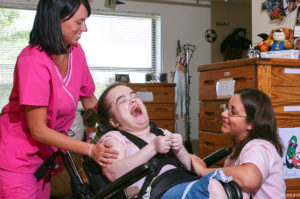Developmental Disability Nurse: Education and Career Information
Disabilities are prevalent in today’s environment, and finding the right person to educate patients and families, and provide the best of care can be challenging. A developmental disability nurse is someone that can help fill the void. They work with patients who have autism, Down’s Syndrome, mentally retarded patients and others. This is a specialized position that is sorely needed in the nursing arena, as there is a huge shortage of qualified nurses to meet needs. This is a rewarding and lucrative position for the right person.
What does a developmental disability nurse do?
This is also known as a special needs nurse. They assist patients who have mental or developmental disabilities that are in a chronic state. These conditions were developed at birth and seriously affects a patient’s ability to maintain basic skills and quality of life. These nurses are also a liaison with families, working to educate and support them in a number of ways. They assist with feeding and performing bodily functions, help to encourage mobility, counsels on the medical requirements of the ailment, and can work with speech therapists to help with language and communication skills. You will find them in a variety of places, including schools, hospitals, home care, primary care centers, group homes, work sites and private organizations. They have a high level of patience and compassion, and are good at being able to interpret the needs of each patient.
How much does a developmental disability nurse earn?
On average, the annual salary of a developmental disability nurse is between $50,000 and $60,000. This number rises based on education, experience and locations. Those who work in private care tend to earn more over time and may also qualify for mileage reimbursement and additional incentives to boost salary and desire to pursue work in this area.
What types of skills are needed to become a developmental disability nurse?
There are a number of skills needed to be successful as a developmental disability nurse:
Active listening: Being able to give full attention to what others are saying, and taking the time to fully comprehend points being made. Being able to ask questions to extract the right information.
Social perceptiveness: Being aware of the reaction of others and understanding why the patient is reacting certain ways.
Service orientation: Looking for ways to assist others with a calm and helpful demeanor.
Critical thinking: Using logic and reasoning to identify the strengths and weaknesses of alternative solutions, conclusions or approaches to problems.
Speaking: Speaking clearly and effectively to convey information.
Coordination: Being able to coordinate processes and procedures, adjusting actions in relation to others.
Monitoring: Monitoring/Assessing performance of yourself, other individuals, or organizations to make improvements or take corrective action.
Judgment and Decision Making: Using judgment to assess resources and patient care, and making informed decisions to help improve quality of life and personal healthcare.
Time Management: Being able to juggle a number of things at one time, coordinating healthcare and keeping patients on a regular schedule.
Writing: Being able to communicate and convey information in written form, keeping the patient chart up-to-date.
Internship Requirements
Internship requirements vary based on school, state and program. Nursing school has a number of clinical requirements needed to graduate from the program, in addition to additional experience and clinical hours required to become certified as a developmental disability nurse.
Educational Requirements
In order to become a developmental disability nurse, there are two options. Students can take the route of becoming a licensed practical nurse (LPN) and acquiring certification upon finishing their program, or taking the route of pursuing a degree as a registered nurse (RN). This requires a four-year nursing program to obtain the Bachelor’s of Science in Nursing (BSN) degree. They will complete coursework in general chemistry, biology, microbiology, human anatomy, physiology, nutrition, statistics, and behavioral science.
Once the degree has been achieved, students must study and sit for the NCLEX-RN exam, which will provide the license to work as a nurse. The nurse should then pursue job experience for at least two years of employment in a developmental disabilities setting. This experience will help the nurse become ready to obtain certification and sit for the Certificate in Developmental Disabilities.
The Registered Nurse Certification in Developmental Disabilities (CDDN) is widely recognized, and is the only certification program for registered nurses specializing in this field. Employers seek individuals with this certification to meet complex nursing care needs, and to maintain a high level of excellence in their practices and facilities. This certification also demonstrates the level of commitment the nurse has in ensuring they have all the foundational education they need to successfully perform their job. This not only benefits the nursing profession and the specialty of developmental disabilities, but also the patients the nurse will care for.
Although it is not required to pursue a master’s degree program, considering going back into a Master’s of Science in Nursing degree program could open the doors of opportunity in a number of ways. This allows a nurse to begin teaching undergraduate courses, become a nursing supervisor, or working with governmental agencies on the care of patients with developmental disabilities. Coupled with the certification, this can be a very lucrative career path worth pursuing. While it may be easier to become certified as an LPN, the opportunities will be very limited moving forward. Expending the extra time and resources going this route may not be as attractive as pursuing an actual degree.
For someone who is interested in caring for patients who have special needs, this is a very rewarding and interesting position. Being able to have the heart and compassion to care for others who may be permanently disabled, or have lost their quality of life is commendable. Although this can be a lucrative opportunity, the reward lies in the value this position offers to families and patients.






